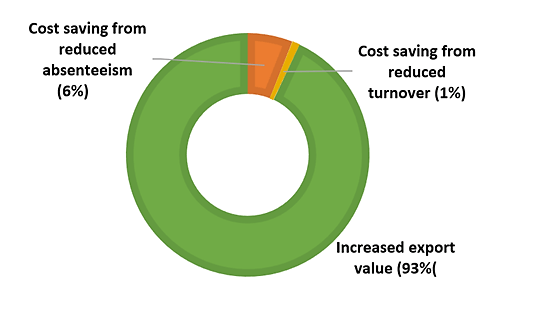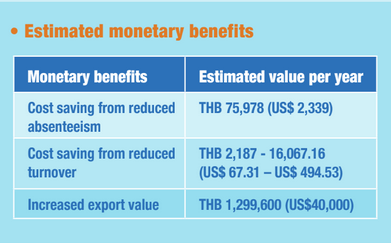Can responsible recruitment lead to profitability? The answer is yes! A cost-benefit analysis carried out by Rapid Asia on a seafood processing company found a successful case of how adopting responsible recruitment can increase its sales and improve worker productivity while creating better working conditions for workers. The main findings have been published in a report under Plan International’s FAIR Fish project.
The Fostering Accountability in Recruitment for Fishery Workers (FAIR Fish) Responsible Recruitment Model (RRM) project has been conducted by Plan International from 2019 to 2022 in a bid to minimise trafficking in persons and forced labour in the recruitment process in the seafood processing sector in Thailand. It was designed to tackle the problem caused by the trafficking and exploitation of migrants from Cambodia and Myanmar. The long list of problems often involves violating the workers’ rights in the recruitment process. Hence, concerted actions are needed to deal with these violations and address these crimes.
The project was conducted in partnership with a medium-sized company in the seafood processing industry. The study surveyed two groups: the seafood company’s management and migrant workers from Cambodia and Myanmar employed by the company. The project was based on the scientific assumptions that working conditions can improve if there is a better understanding of the nature of forced labour and human trafficking in recruiting workers.
During the seven months of the program, the pilot company made significant changes in the company’s internal policies and practices, focusing on those that significantly impact the company’s workers. The company took concrete actions to dump exploitative practices, starting from the recruitment processes, including recruiters’ compliance with the country’s anti-forced labour regulations and policies and the commitment by all involved to promote responsible and transparent recruitment policies and practices.
Protecting the rights of foreign and domestic workers and combating crime was not merely the right thing to do. It also brought benefits for the company. As shown in Figure 1 below, the most significant benefit was increased export value. Other benefits in the form of reduced absenteeism and turnover were also found but were far less significant.

Figure 1: Benefits of implementing responsible recruitment
The cost-benefit analysis estimated the monetary benefit of RRM implementation to be close to 1.4 million Thai baht (approximately USD 42,000), compared to the estimated costs of implementation of 110,200 Thai baht (USD 3,400). Hence, the estimated monetary net benefits of the RRM implementation was around 1.3 million Thai baht (approximately USD 38,600).

Figure 2: Estimated monetary benefits
Other intangible benefits included strengthened grievance mechanisms and remediation, enhanced company reputation, increased competitiveness, increased customer satisfaction, increased worker morale, and strengthened labour rights for workers.
The results show that adopting responsible recruitment is good for business and the model developed by Plan International can also be applied to other sectors. The report is available in English and Thai, and can be found here.
If you found this article useful, please remember to ‘Like’ and share on social media, and hit the ‘Follow’ button never to miss an article.
About the authors: Daniel Lindgren is the Founder of Rapid Asia Co., Ltd. a management consultancy firm based in Bangkok that specialises in evaluations for programs, projects, social marketing campaigns and other social development initiatives. Israr Ardiansyah is an independent consultant working with Rapid Asia.

